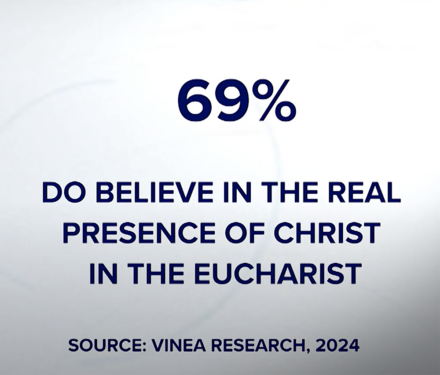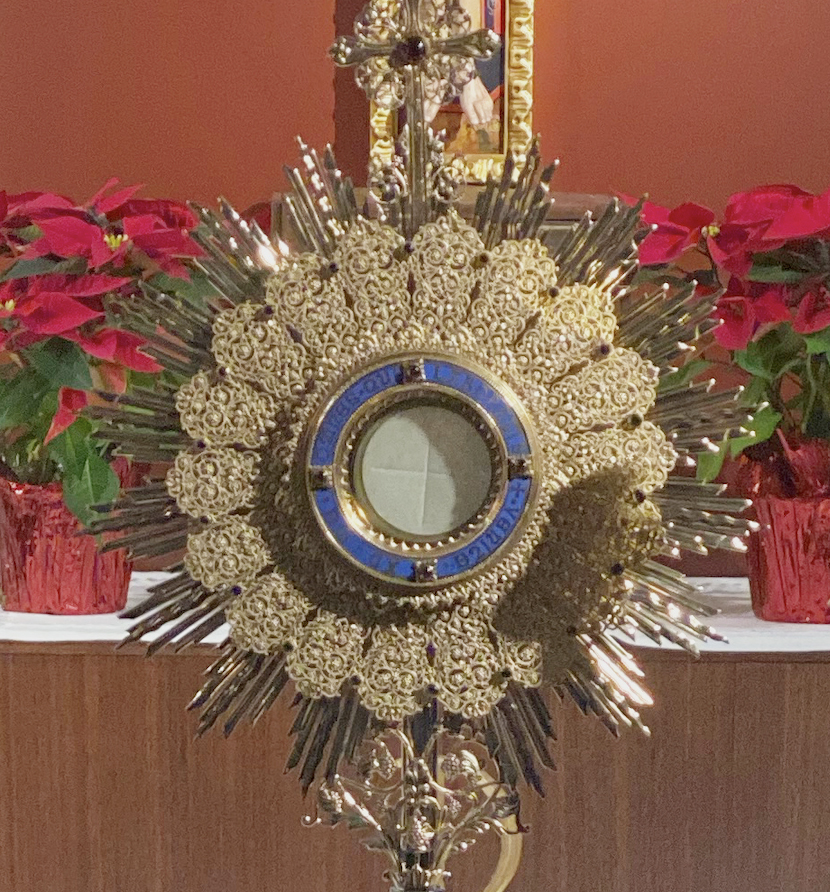PROSPECT HEIGHTS — As the National Eucharistic Revival nears its Congress in Indianapolis, July 17-21, a recent study suggests that the belief that Christ is “truly present” in the Eucharist is much higher than previously reported.
Maryland-based Vinea Research released the study “Do Catholics Truly Believe in the Real Presence?” on June 3. The report found that 69% of Mass-going Catholics do believe in transubstantiation — the term that declares Jesus, in body and blood, is present in the Eucharistic.
The survey’s results countered a 2019 Pew Research study that alarmed bishops and priests by asserting that only 31% of Mass-going U.S. Catholics believed that the bread and wine “actually become” the body and blood of Jesus. The other 69% of Catholics, according to Pew, believed the bread and wine are “symbols” of Christ’s flesh and blood.
In response to the Pew poll, the U.S. Conference of Catholic Bishops (USCCB) called for the three-year National Eucharistic Revival, which includes the Eucharistic Congress, the first since 1941, in Indianapolis. The event aims to inspire Catholics to have a more intimate relationship with Jesus through the Eucharist.
Vinea is a market research firm that studies Catholicism in the U.S. Its founder and president, Hans Plate, is Catholic.
He said it’s possible respondents to the Vinea survey may have been influenced by information flowing from events connected to the National Eucharistic Revival. Still, Plate said the major difference between the Vinea and Pew studies was the terms used in their questioning.
He explained his firm formed questions based on traditional knowledge of the Church, its doctrines, and teachings.

“The two phrases that I saw repeatedly in either the Catechism or the USCCB documents were ‘Real Presence’ or ‘truly present,’ he said. “I chose ‘truly present.’ ”
Thus, 69% of Catholics surveyed by Vinea confirmed their belief in Jesus’s presence in the Eucharist.
Bishop Robert Brennan said he has always believed the 2019 Pew study was “flawed” and its questions reflected a “fundamental lack of understanding of Catholic belief in the Real Presence.”
The bishop said the more compelling crisis is in Mass attendance.
Pew reported in 2017 that 39% of Catholics reported going to Mass weekly, down from 75% in the mid-1950s. The Gallup organization put that number at 33% last March.
“If we really believe what we profess about the real presence of Christ in the Eucharist, we would never miss the opportunity to encounter him at Mass,” Bishop Brennan said.
Still, Bishop Brennan said he has seen encouraging signs from local events, like the Lenten Pilgrimages this year and last, and the Diocesan Eucharistic Revival April 20 at Louis Armstrong Stadium in Queens.
“I have noticed, and pastors are reporting, some growth in the numbers of persons attending Mass these past months,” Bishop Brennan said.
He added that he hopes the local events, coupled with the National Eucharistic Congress, will spur much more renewal.
In an interview with OSV News, Gregory Smith, Pew’s associate director of research, said his firm’s questions have “a number of strengths,” among them being “quite neutral.”
Plate said he respects the Pew Research Center and its 20-year legacy of work. He said its surveys on affiliation and Mass attendance were on the mark, but those involved “simple” questions.
“Once we get into something like the Eucharist, I think that’s different,” he said.
Plate expressed frustration that the Church relies on non-Catholic institutions — Pew, Gallup, and others — to provide “Catholic-level data,” but from people who, according to him, don’t have an in-depth knowledge of Catholicism.
Plate said people have asked if he is biased when researching his faith.
“The answer is actually ‘no,’ ” he said, “because what we look for in any industry is ‘content experts.’ ”
Bishop Brennan said he was excited to accompany “pilgrims” from the diocese at the Congress in Indianapolis.
“I hope this week will do on a national level what we experienced here in Queens at our Revival,” he said. “I hope it will invigorate our faith and deepen our love for Jesus present in the Eucharist.”
Next, he said, will come the “critical stage” of being “missionaries of the Eucharist.”
“All of us,” he said, “are now sent forth as witnesses to Christ, to his merciful love, to the fact that he walks among us, to his presence in the Eucharist.”

